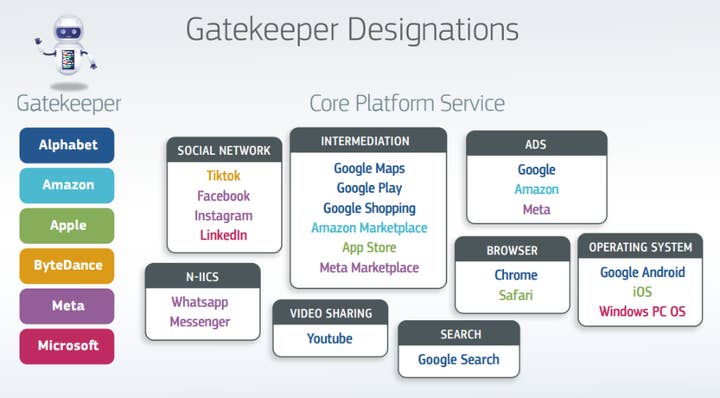How does the Digital Markets Act impact mobile game developers?
When the EU introduced the Digital Markets Act (DMA) in November 2022, it was seen as a strategic move to transform the dynamics of the digital market. Now, as the DMA begins to take effect, its implications for the gaming and interactive entertainment sectors are unfolding.
An Overview of the Digital Markets Act (DMA)
The DMA enhances existing competition policies in the EU:
- Its key purpose is to foster equitable online practices and contestable digital marketplaces by limiting the dominance of certain "gatekeepers."
- It employs a series of stringent rules aimed at specific "core platform services" (CPS), important online services like app stores and platforms. Companies that violate these rules face heavy penalties, up to 10% of their worldwide revenue, and 20% for repeated breaches.
Identifying 'Gatekeepers' and Targeted Services
To be labeled a gatekeeper, a company must substantially impact the EU market, act as a key access point for businesses to reach users, and have a strong, lasting market position.
As of now, firms like Google, Amazon, Apple, TikTok (ByteDance), Meta, Microsoft, and Booking.com have been identified as gatekeepers, affecting 24 CPSs. For the initial six firms identified in September 2023, these rules became applicable in March 2024, prompting significant changes in company policies.

Mobile gaming is likely to experience the most immediate impact due to the DMA, especially with Apple and Google's platforms being central to game distribution and development.
How the DMA Affects Various Market Participants
Though the DMA lacks specific gaming-targeted provisions, its broad implications affect partners, clients, and rivals of these gatekeepers, necessitating awareness of these new regulations by all industry players.
Potential Advantages for Mobile Gaming Through the DMA
While the DMA rules are broadly constructed for diverse markets, specific provisions notably alter mobile gaming. Here, key rules are highlighted to elucidate their impact on video gaming.

New Paths for Mobile Game Distribution
Amid DMA changes, mobile game distribution experiences significant evolution. Key developments include:
Alternative App Stores and Sideloading: Gatekeepers like Apple must allow the development of independent app marketplaces and facilitate sideloading, contrasting with Google's historically more open ecosystem.
Apple's restrictive mobile ecosystem adapts under these new rules, welcoming competing app distribution channels like the AltStore and SetApp, challenging its exclusive App Store. Meanwhile, Google's model remains largely unchanged, with most Android downloads via the Play Store.
Industry players—both emerging and established—must adapt to evolving challenges and prospects.
Ensuring Equitable App Store Access: Gatekeepers must adopt fair, reasonable, and non-discriminatory access rules for app store listings, enhancing potential benefits for developers and ensuring better access for cloud and streamed games.
Expanded Flexibility for Game Offers and Transactions
DMA regulations redefine transaction and content offering possibilities for developers on mobile platforms.
External Offers and Content: Developers gain the autonomy to inform users of offers outside the gatekeeper's ecosystem and facilitate those transactions, while also requiring gatekeepers to support content purchased externally within their apps.
Choice of Payment Methods: Developers no longer need to use the gatekeeper's payment systems for in-app purchases, allowing alternative, potentially cheaper methods.
Enhancing Data Control for Gamers and Developers
The DMA promotes greater data autonomy for both mobile gaming users and developers, providing:
Data Privacy for Developers: Gatekeepers cannot use developers’ non-public data to compete against them, fostering better competition and fairness.
Data Portability for Gamers: Users can freely transfer game data to different ecosystems, ensuring continuity and protecting user scores and progress.
Caution is advised against unrealistic expectations; gatekeepers retain decision power over interoperability requests.
Improved Access to User Data: Gatekeepers must share valuable user data insights with developers, helping them refine and enhance their products.
Increased Opportunities in Game Development
DMA regulations impact game development phases, expanding technical possibilities:
Interoperability: Gatekeepers must provide access to tools and systems they use, leading to better game integration and user experiences, despite a potential for denied requests if they compromise system integrity.
Browser Engine Choices: Developers can now choose different engines for web-based apps, enhancing functionality and breaking free from proprietary restrictions.
DMA's Relationship with National Regulations
The DMA functions as a central regulatory framework, but some national authorities, like Germany’s FCO, seek to enforce their own rules where possible.
Germany has previously designated companies based on their broad market impact, preceding the DMA, with companies like Alphabet, Amazon, Apple, and Meta under scrutiny for specific behaviors affecting national and international markets.
DMA improvements enhance data oversight for mobile gamers and developers, securing more balanced competition.
The UK's Position Post EU Departure
In May 2024, the UK instituted the Digital Markets, Competition and Consumers Act (DMCCA), parallel to the DMA, with a potential rollout for gaming-related regulations anticipated in late 2025.
Looking Ahead
The evolving regulatory landscape, including the DMA, remains pivotal in mobile gaming, aiming to empower both developers and users. As new systems unfold, the industry's reaction and adaptation will shape potential gains. The transformation journey continues in this interconnected digital arena.
Verity Egerton-Doyle is a partner at Linklaters in London and co-lead of their Games and Interactive Entertainment division. Tobias Rump serves as antitrust counsel in Düsseldorf, and James Hunter is an antitrust managing associate in London.
